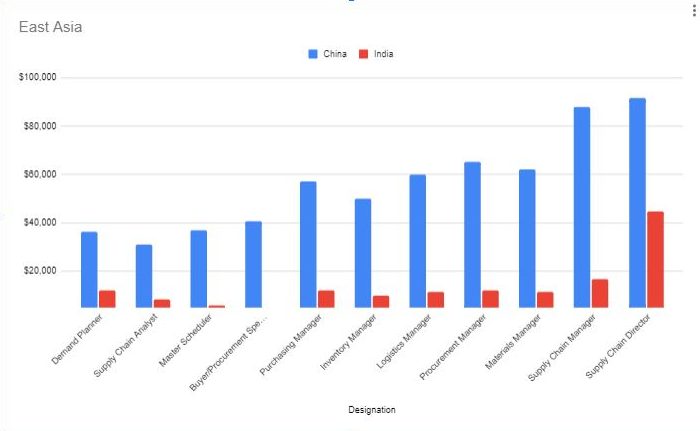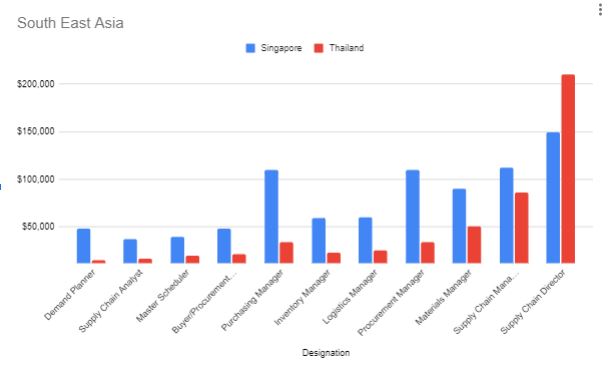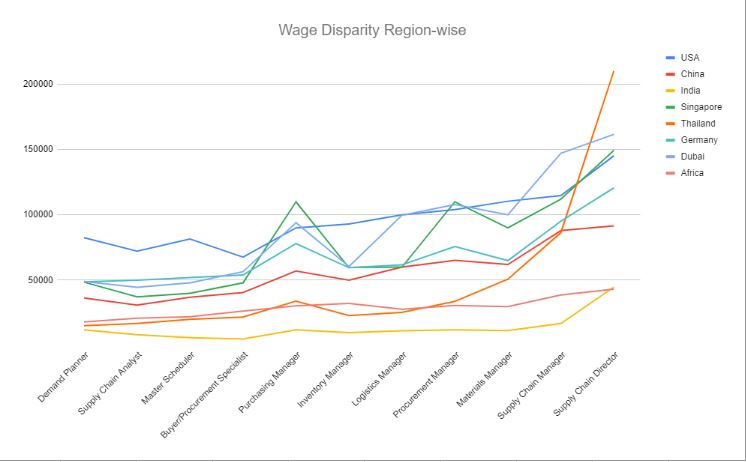Are you considering a career in supply chain management? Curious about the salaries to expect? Look no further! In this article, we will explore the wide range of salaries in supply chain management, from entry-level positions to executive roles for each region.
Supply chain management is a rapidly growing industry. It plays a crucial role in ensuring the efficient movement of goods from production to consumption. As companies increasingly recognize the importance of optimizing their supply chains, the demand for skilled professionals in this field is on the rise. This demand, coupled with the complexity of supply chain management, has resulted in a wide range of salaries across different job levels.
From entry-level positions such as procurement officers and logistics coordinators to higher-level roles like supply chain directors and vice presidents, each comes with its own set of responsibilities and corresponding salary ranges. So, let’s dive in and explore the fascinating world of supply chain management salaries!
Salaries You Can Expect in Supply Chain Management Region-Wise:
Here is a list of salaries for different supply chain designations: Demand planner, Supply chain analyst, Master scheduler, Purchasing manager, Inventory manager, Logistics manager, Procurement manager, Materials manager, Supply chain manager, and Supply chain director. Let’s explore the salary ranges region-wise:
United States of America:
In the United States of America, the average salary of supply chain management is $92,441 per year or $44.44 per hour. Entry-level positions start at $55,000 per year while most experienced workers make up to $157,750 per year. Below is the table that shows average salaries per annum according to the designations:
| Sr. # | Designation | Avg Salary/Year ($) |
| 1 | Demand Planner | $82,500 |
| 2 | Supply Chain Analyst | $72,201 |
| 3 | Master Scheduler | $81,500 |
| 4 | Buyer/Procurement Specialist | $67,698 |
| 5 | Purchasing Manager | $90,000 |
| 6 | Inventory Manager | $93,000 |
| 7 | Logistics Manager | $100,000 |
| 8 | Procurement Manager | $104,000 |
| 9 | Materials Manager | $110,342 |
| 10 | Supply Chain Manager | $114,750 |
| 11 | Supply Chain Director | $145,000 |
East Asia:
In China, the average yearly salary in the field is $56,245. Ranging from the lowest amount of $31,000 for a newcomer in the industry to the highest-paying job of $91,568.
In India, the average yearly salary is $13,628 ranging from the lowest of $5,028 to $44,715.
| Sr. # | Designation | Avg Salary/Year ($) China | Avg Salary/Year ($) India |
| 1 | Demand Planner | $36,420 | $12,030 |
| 2 | Supply Chain Analyst | $31,000 | $8,300 |
| 3 | Master Scheduler | $37,000 | $6,015 |
| 4 | Buyer/Procurement Specialist | $40,572 | $5,028 |
| 5 | Purchasing Manager | $57,000 | $12,030 |
| 6 | Inventory Manager | $50,000 | $9,961 |
| 7 | Logistics Manager | $60,000 | $11,380 |
| 8 | Procurement Manager | $65,225 | $12,030 |
| 9 | Materials Manager | $62,000 | $11,500 |
| 10 | Supply Chain Manager | $87,906 | $16,920 |
| 11 | Supply Chain Director | $91,568 | $44,715 |
Southeast Asia
The average monthly salary for Supply Chain jobs in Thailand ranges from $15,233 to $209,873. The average Supply Chain Manager salary in Singapore is $111,916. Salary ranges can vary widely depending on many important factors. These factors include education, certifications, additional skills, and the number of years you have spent in your profession.
| Sr. # | Designation | Avg Salary/Year ($) Singapore | Avg Salary/Year ($) Thailand |
| 1 | Demand Planner | $48,497 | $15,233 |
| 2 | Supply Chain Analyst | $37,305 | $16,925 |
| 3 | Master Scheduler | $40,000 | $20,000 |
| 4 | Buyer/Procurement Specialist | $48,000 | $21,848 |
| 5 | Purchasing Manager | $109,910 | $34,000 |
| 6 | Inventory Manager | $59,689 | $23,000 |
| 7 | Logistics Manager | $60,000 | $25,388 |
| 8 | Procurement Manager | $109,910 | $33,850 |
| 9 | Materials Manager | $90,000 | $50,775 |
| 10 | Supply Chain Manager | $111,916 | $86,318 |
| 11 | Supply Chain Director | $149,220 | $209,873 |
Europe
The average supply chain manager’s gross salary in Germany is $95,000 or an equivalent hourly rate of $50. In addition, they earn an average bonus of $8,110. Salary estimates are based on salary survey data collected directly from employers and anonymous employees in Germany. An entry-level supply chain manager (1-3 years of experience) earns an average salary of $72,100. On the other end, a senior-level supply chain manager (8+ years of experience) earns an average salary of $127,960.
| Sr. # | Designation | Avg Salary/Year ($) |
| 1 | Demand Planner | $48,712 |
| 2 | Supply Chain Analyst | $50,000 |
| 3 | Master Scheduler | $52,000 |
| 4 | Buyer/Procurement Specialist | $54,000 |
| 5 | Purchasing Manager | $78,000 |
| 6 | Inventory Manager | $59,525 |
| 7 | Logistics Manager | $61,690 |
| 8 | Procurement Manager | $75,795 |
| 9 | Materials Manager | $65,000 |
| 10 | Supply Chain Manager | $95,000 |
| 11 | Supply Chain Director | $120,519 |
United Arab Emirates
The average Supply Chain Manager salary in UAE is $147,019 per annum. The highest salary of a Supply Chain Management in UAE is $161,477 and the lowest salary is $44,611. This is based on 19 Supply Chain Managers located in the UAE who have recently registered with GulfTalent.
| Sr. # | Designation | Avg Salary/Year ($) |
| 1 | Demand Planner | $49,006 |
| 2 | Supply Chain Analyst | $44,611 |
| 3 | Master Scheduler | $48,000 |
| 4 | Buyer/Procurement Specialist | $56,477 |
| 5 | Purchasing Manager | $93,934 |
| 6 | Inventory Manager | $60,441 |
| 7 | Logistics Manager | $99,646 |
| 8 | Procurement Manager | $107,814 |
| 9 | Materials Manager | $100,005 |
| 10 | Supply Chain Manager | $147,019 |
| 11 | Supply Chain Director | $161,477 |
Africa
The average supply chain management salary in South Africa is $29,102 per year or $20 per hour. Entry-level positions start at $18,072 per year, while most experienced workers make up to $43,158 per year.
| Sr. # | Designation | Avg Salary/Year ($) |
| 1 | Demand Planner | $18,072 |
| 2 | Supply Chain Analyst | $20,900 |
| 3 | Master Scheduler | $22,102 |
| 4 | Buyer/Procurement Specialist | $26,410 |
| 5 | Purchasing Manager | $30,410 |
| 6 | Inventory Manager | $32,207 |
| 7 | Logistics Manager | $27,766 |
| 8 | Procurement Manager | $30,632 |
| 9 | Materials Manager | $29,817 |
| 10 | Supply Chain Manager | $38,648 |
| 11 | Supply Chain Director | $43,158 |
Summary
Factors to Wage Disparity in Supply Chain Management Salaries:
Geographical location
Geographical location is a big factor in supply chain management salaries. Different living costs, local market conditions, industry focus, and economic factors all affect pay levels. In places where living costs are high, workers usually get paid more to keep up with the higher expenses. Regions with strong economies or a lot of demand for specific skills might also offer higher salaries. Local labor laws, how talent moves around, and government incentives add more complexity to salary differences in different places. Supply chain professionals must grasp these factors when making career choices. This becomes more important when it comes to understanding how wages vary based on location.
Company Size
Company size is a pivotal factor contributing to wage disparities in supply chain management. Larger organizations, with their extensive resources and capabilities, often offer more competitive compensation structures compared to smaller counterparts. This discrepancy stems from the larger companies’ ability to allocate greater budgets to attract and retain top talent, resulting in higher salaries for supply chain professionals. The scale and complexity of operations within larger enterprises also lead to more hierarchical structures, with upper management roles commanding higher salaries, contributing to the overall wage disparity based on the size of the employing organization.
Industry Trends
Industry trends play a pivotal role in determining wage disparities within supply chain management. As they prioritize different sectors and value roles differently. Emerging technologies, market demands, and evolving consumer preferences contribute to varying levels of complexity. Professionals working in industries experiencing rapid growth or transformation may witness higher demand for their skills, leading to increased compensation. Conversely, those in sectors facing economic challenges or slower innovation may encounter comparatively lower salary growth. Understanding industry-specific trends is crucial for supply chain professionals to align their skills with market demands, ultimately influencing their earning potential and contributing to wage disparities across different sectors.
Demand and Supply
Demand and supply dynamics significantly contribute to wage disparity in supply chain management. When there is a high demand for specific skills or roles within the industry and a limited supply of professionals possessing those skills, it creates a competitive job market. In such scenarios, companies are compelled to offer higher salaries to attract and retain top talent, resulting in wage disparities. Conversely, in areas where the supply of skilled professionals exceeds the demand, salaries may be comparatively low. This is because individuals compete for available positions. This leads to a more balanced compensation landscape. Understanding this interplay between demand and supply is crucial for supply chain professionals. This helps them navigate the job market and strategically position themselves for salary negotiations and career advancement.
Government Policies
Government policies play a pivotal role in shaping wage disparities within the field of supply chain management. Minimum wage laws, labor regulations, and broader government policies directly influence compensation structures, impacting the baseline for entry-level salaries and setting the framework for salary progression. These policies can either mitigate or exacerbate wage gaps by establishing a fair and equitable environment or, conversely, by perpetuating systemic inequalities. The regulatory landscape significantly contributes to the overall dynamics of supply chain management salaries, making it essential for professionals to comprehend and engage with the prevailing government policies to advocate for fair compensation practices in the industry.
Experience and Skills
Experience and skills are significant determinants of wage disparity in supply chain management salaries. Professionals with extensive experience in the field often command higher wages. This reflects their accumulated expertise and ability to navigate complex challenges. Additionally, possessing specialized skills, certifications, or advanced degrees enhances one’s market value, contributing to higher compensation. As a result, the intersection of experience and skills plays a crucial role in shaping salary levels. This creates distinctions between entry-level positions and management roles within the supply chain industry. Those who continually invest in skill development and accumulate valuable experience are well-positioned to ascend the salary ladder in this dynamic and competitive field.
Conclusion
In conclusion, moving up from entry-level to management roles in supply chain management involves dealing with different factors affecting salaries. Things like where you work, and the size of the company also affect wages. Government rules, the demand for your skills, and how much experience you have also play a part. Among all these, having more experience and special skills usually means you can earn more. So, if you keep learning and gaining experience, you’ll have a better chance of getting higher pay in the dynamic field of supply chain management. Understanding these factors helps you make smart career choices and ask for fair pay.
Sources:
https://www.ascm.org/ascm-insights/the-10-highest-paying-supply-chain-jobs/
https://www.salaryexpert.com/salary/job/
https://www.glassdoor.com/Salaries/
https://www.morganmckinley.com/sg/salary-guide/








